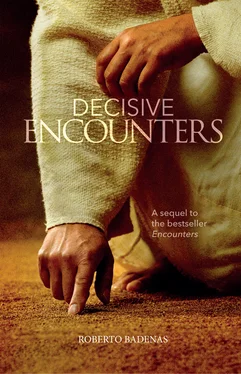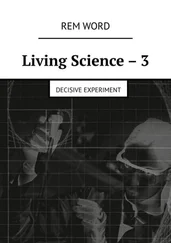The newly initiated Teacher has just come across His first two disciples.11
He has given up the easy routine of His profession as a craftsman to follow the difficult vocation of an educator. He has stopped building and furnishing homes to start building and furnishing minds, a challenging call that imposes on His spirit with all the force of that which comes from heaven.
Upon closing His carpentry shop, His family circle and His neighbors insisted that He was making a serious mistake. Being such a good professional and with His exceptional talent, leaving the modest security of His customers, thereby risking His future, seemed like madness to them. It always happens like so. If the greatest resistance to do something big tends to come from ourselves, the most reticent opposition to assume new risks can emerge from our closest surroundings and from those who love us most.
But Jesus does not seek an easy life, sheltered by His many relatives:12 He wants a useful life, even if no one supports Him. His ideal does not belong to this world, and for that reason He does not follow in the footsteps of the majority. He has a dream, a grand plan. He wants to try something new to build a better world, changing people’s lives.13 And He aspires to share his ideals, dreams, and plans with the best youth of the country. He does not have experience, titles, means, or influences. But He has God and that is enough to feel optimistic, spirited, and strong.
Furthermore, His first two disciples are already there, waiting to receive their first lesson. This lesson, initial and definitive,14 is the most important of all. It consists of merely discovering the power that the divine presence transmits in the life of whoever seeks it. And He is pleased to accompany those who really seek Him, no matter how young they are and how confused they find themselves.
There is no inhabited place on the entire way from the Dead Sea to Jericho. However, the Teacher without hesitating takes His new friends to the place where He claims to reside at the moment. Without a doubt, it involves the place where He had stayed during his visit to the Baptist, about forty days ago . . . a cave such as many that abound in the area? A shed built with reeds, like those that are occupied one after another by travelers at the side of the road? Or rather, He leads them to a selected place whereupon to pitch the tent He is carrying in His backpack, like so many travelers?15 The old texts do not state it. But they specify that the young men went and saw where the traveling rabbi was dwelling, and that He shared with them His poor lodging until the following day.
They would soon decide to remain with Him forever.16
They will never forget the exact hour of that decisive moment: the tenth hour, penultimate hour of the afternoon.17
The day draws to a close on the travelers. The sun sets between golden-reddish clouds. But in the hearts of those three young men something very new awakens.
A magical, pivotal encounter for the disciple apprentices as well as for the new Teacher . . .
What might they have talked about on that unforgettable evening under the stars? The writings of the main characters do not mention it.18 They specify only that the moment at which these young travelers encounter Jesus and decide to stay with Him marks a milestone in their history. Because with Him they found what they were seeking, many things that they were not seeking, other things that they were seeking without knowing it and something much better than what they were seeking.
The lesson that the new Teacher begins to impart involves a verb that is conjugatable in all persons, in all tenses, and in all forms: the verb “to love.”19 An irregular and unpredictable verb where it exists because it is at odds with imperatives; it lacks perfect tenses; and its present tends to be imperfect and its future conditional. A verb that demands to be exercised in all its forms and with all its synonyms: to like, to appreciate, to take in, to support, to value, to respect, to share. But because the conjugation of that verb does not fit in books, these first disciples must learn it in the action.
With astonishment, they discover that the personification of the verb to love has set out to encounter them on the path of their search, and is catching up to them where they are, in that unexpected camping.20 If to love is really to seek the good of the other, to want their happiness, these disciples discover love incarnate in Jesus, solidarity in person, and the practical demonstration of what it is to really love, unconditionally: not an ephemeral feeling but an engine of action. Vital principle that permeates their person and that makes them recognize in their Teacher someone who comes from God.21
John, probably the youngest disciple, years later alludes to that feeling as so indefinable and new, which he began to experience that day in the presence of the Teachers’s amazing capability for empathy, “feeling accepted and understood but not daring to express gratitude for it.”22 And since then he appoints himself with the most daring honorific title anyone had ever flaunted: “the disciple whom Jesus loved.” 23
Therefore the great lesson from the Teacher to His first disciples and to all those who will follow them is to learn to conjugate the verb to love. Beginning right there and continuing in their homes, in their neighborhoods, in the towns where they live, in the shops where they work, in the spaces where they enjoy recreation and, of course, in the sanctuaries where they worship. If the divine Word has come closer to them because of love, practicing the verb to love will now also be the way to get closer to another and elevate themselves to heaven.
And so, the young men discover that, in the company of Jesus, to find the meaning of their lives, they do not need to seek a place but a person. That to feel the presence of God, withdrawing themselves to the solemnity of a temple is not necessary. His closeness is also found in the refreshing embrace of water from a bath at sundown. That to enter into communion with the sustainer of all things, participating in the ritual of a sacrifice, is not necessary. One can take communion with Him by gratefully sharing several bits of pomegranate and a handful of dates. That to get closer to the Creator of the universe, no mystical initiation is required; allowing yourself be carried away by the emotion of an astonished contemplation of the stars suffices.
The travelers have found the Teacher whom were searching for. But the latter puzzles them. He shatters all their plans. He does not fall within any of their categories. They do not know how to describe Him: admirable adviser, Teacher and friend, path and goal, love in person, serene joy, truth and life . . .
His words are at the same time so simple and profound that each of His reflections seems inexhaustible, in a way that they never reach the depth of his thoughts.
There is, as well, something that deeply moves and scares them. Because the Teacher caresses, with amazing realism, the impossible dream of the most ambitious prophets and reformers: to change the world.
And they would like to be a part of that dream.
But, will they be capable of following the Teacher in such an inconceivable plan?
1. The Depression of the Dead Sea is the site of Sodom and Gommorah, consumed according to tradition by fire coming down from heaven (Gen. 19:1-28).
2. Regarding the Essene community of Qumran, see Flavio Josefo, The Wars of the Jews, Book 1, Barcelona: Orbis, 1985, pp. 122-126.
3. John 1:19-28.
4. These are Jesus’ first words recorded in the Gospels (John 1:35-39, NKJV).
5. John 1:35-37.
6. Ellen G. White, The Desire of Ages, p. 112.
7. My studies of the gospels have led me to the conclusion that these first disciples of Jesus were younger than 30 years of age. The first and foremost reason is that they call him “rabbi” (Teacher). Jesus was then about 30 years of age (Luke 3:23) and had never worked as a Teacher, but as a carpenter. In that patriarchal society (of traditional gerontocracy) it was not conceivable that a Teacher were younger than his disciples, or that he would take it upon himself to teach prior to 40 or 50 years of age. If these young men address Jesus calling him “rabbi” it was because they clearly appeared to be younger than he. Until the end of his ministry, Jesus continued calling them paidia (John 21:5), Greek term that means ‘children’ or ‘little children,’ an appellation that would be unthinkable in that culture if they had been older than he. They were more likely to be about 20 years of age. Their youth would explain their enormous availability, which allowed them to follow Jesus full time for more than three years, what would have been very difficult if they had had families to support (Luke 18:28-31). See Ellen G. White, The Desire of Ages, p. 73.
Читать дальше












